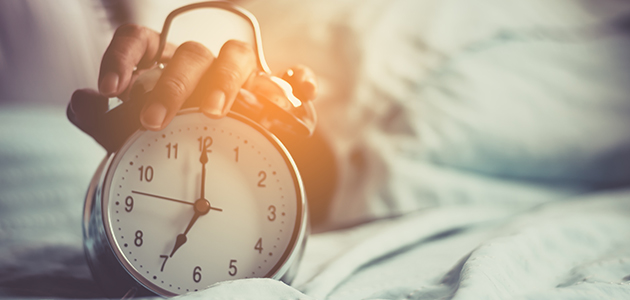Everyone loves that extra hour of sleep we get in the fall, just as things are getting darker and colder, and all we want to do is stay inside and snuggle up under a blanket. But even though it brings a little extra light to the end of the day, very few people are thrilled when we “spring ahead” in March and lose that precious hour. Aside from whatever havoc the loss wreaks on the actual day the clock springs forward – this year March 10 – sleep schedules (and tempers and moods) can be off for days afterward.
Why exactly does the biannual time change mess us up so much? According to WebMB1, it’s because moving the clock in either direction changes the main cue for setting and resetting our 24-hour natural cycle: light. So the circadian rhythm we’ve adjusted to is suddenly out of sync with the “new” cycle of night and day foisted upon us by the time change.
Eventually we all do get back into the swing of things and adjust, but those first few days can be a challenge. In fact losing that hour of sleep can make you more than just a little groggy; it can also affect your mood, motor skills, appetite and even your heart.2
Knowing that it’s going to be a struggle that can potentially even impact your health, it makes sense to try to avoid those risks by taking a few simple steps to gradually adjust to the time change.
A Healthier Michigan3 offers the following advice for helping your body and mind adjust to Daylight Saving Time:
- Slowly trick your body. Staring a few days before the clocks spring ahead, go to sleep and wake up 10 to 15 minutes earlier than normal. This strategy slowly eases your body into the new sleep schedule, so when it comes to the day you actually have to put the clocks ahead it’s not nearly as noticeable to you.
- Knock off the weekend nap. A Saturday nap is really tempting – and naps can actually be good for you – but this Saturday isn’t the time to indulge in extra sleep that may make it more difficult for you to nod off at bedtime, because you have to go to bed earlier and get up earlier the next day. It may sound counterintuitive, but if you’re drowsy, get up and go for a walk to reinvigorate yourself. A bit of extra exercise will make you even more ready for that early bedtime!
- Adjust the lights. As we mentioned, light is the primary cue for your circadian rhythm, so in the days before Daylight Saving Time, turn on your lights as soon as you wake up, and turn off as many lights (and TV and computer screens) as possible in the evening to get your body ready for sleep.
- Watch what you drink. Caffeine and alcohol can interfere with your sleep, especially when you drink them right before bed, so limit or eliminate your intake of these kinds of drinks in the days leading up to Daylight Saving Time to help make your sleeps as restful as possible.
- Relax before bed. You’re not primed for sleep when you’ve just watched a tense drama on TV, or spent an hour tweeting, or had a rigorous workout. Instead, do something relaxing to wind down an hour before bed. Turn off all the devices and have a warm bath, read a book, meditate, or turn down the lights and just talk with your partner. Relaxing activities will help you feel sleepy and ready for bed.
If you’re someone who regularly struggles with sleep, the idea of losing an hour may be very stressful – which isn’t going to help the situation at all!
SOURCE
1 https://www.webmd.com/sleep-disorders/features/coping-with-time-changes
2 https://www.cbsnews.com/news/daylight-saving-time-affects-your-health-wellness/
416897 D CAN/US (03/19)





